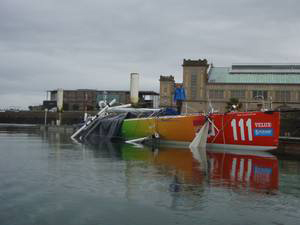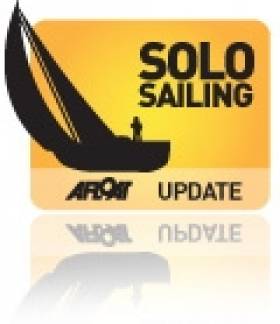Displaying items by tag: Eco 60 class yacht
Belgian Determined to Make Start Line despite Dismasting
Belgian solo sailor Christophe Bullens was dismasted this morning off the coast of France en route to the start of the Velux 5 Oceans.
The 49-year-old skipper had been sailing his Eco 60 class yacht Five Oceans of Smiles in 18-knot winds and choppy seas 15 miles from the Normandy coast when disaster struck.Christophe was down below with another crewmember while two more crew were on deck. They then heard a snapping noise, thought to have been one of the mast's shrouds breaking. Christophe raced on deck and saw the mast snap in two places. All four crew were able to react in time to avoid the falling mast and no-one was injured.The sails and rigging ended up under the boat, blocking the propeller. CROSS Jobourg, the regional centre for maritime surveillance and safety, dispatched a rescue boat from Cherbourg to aid Five Oceans of Smiles.

It took more than two hours to prepare Five Oceans of Smiles for the tow back to Cherbourg, which then took three hours.
The dismasting caused serious damage to the starboard side of Five Oceans of Smiles including a hole in the hull by the ballast tanks. The sails are beyond repair. Christophe had been on his way to La Rochelle, home of the 30,000-mile solo ocean race which starts on October 17. The dismasting comes just weeks after he completed a gruelling 2,500-mile qualifying passage from Plymouth in the UK to the southern tip of Ireland then round the Azores off Portugal. During the passage Five Oceans of Smiles was tested in a wide range of weather conditions from strong winds and big seas to light airs. On Christophe's arrival back to Belgium Five Oceans of Smiles' rigging was thoroughly inspected. Earlier this week parts of the rigging were completely replaced. "Nothing is finished," Christophe said after reaching Cherbourg. "I will do everything to be on the startline in La Rochelle on the 17th of October."Christophe's Team Sapphire, aided by the VELUX 5 OCEANS race management team, are now doing all they can to ensure Christophe makes the start of The Ultimate Solo Challenge.





























































